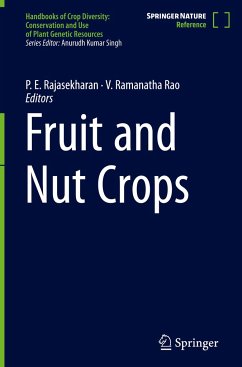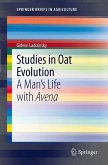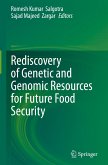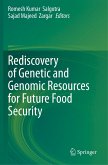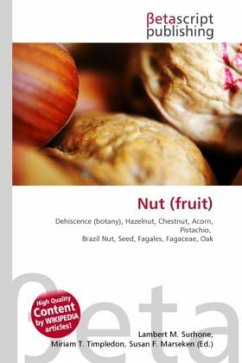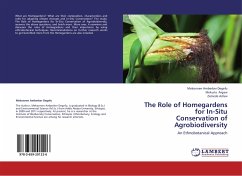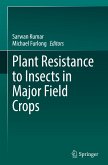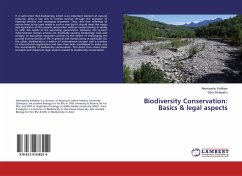Fruit and Nut Crops
Herausgegeben:Rajasekharan, P. E.; Rao, V. Ramanatha
Fruit and Nut Crops
Herausgegeben:Rajasekharan, P. E.; Rao, V. Ramanatha
- Gebundenes Buch
- Merkliste
- Auf die Merkliste
- Bewerten Bewerten
- Teilen
- Produkt teilen
- Produkterinnerung
- Produkterinnerung
Fruit and Nut Crops: A Treasure Trove of Diversity and Resilience Dive into the fascinating world of fruit and nut crops in this comprehensive volume. Explore their origins, evolution, and global journey, from wild ancestors to diverse cultivars nourishing us today. Uncover their crucial role in food security, providing vital nutrients and supporting livelihoods.
This book champions urgent conservation efforts in the face of threats like habitat loss and climate change. It delves into both ex situ and in situ strategies, emphasizing the importance of preserving genetic diversity for the…mehr
Andere Kunden interessierten sich auch für
![Studies in Oat Evolution Studies in Oat Evolution]() Gideon LadizinskyStudies in Oat Evolution39,99 €
Gideon LadizinskyStudies in Oat Evolution39,99 €![Rediscovery of Genetic and Genomic Resources for Future Food Security Rediscovery of Genetic and Genomic Resources for Future Food Security]() Rediscovery of Genetic and Genomic Resources for Future Food Security154,99 €
Rediscovery of Genetic and Genomic Resources for Future Food Security154,99 €![Rediscovery of Genetic and Genomic Resources for Future Food Security Rediscovery of Genetic and Genomic Resources for Future Food Security]() Rediscovery of Genetic and Genomic Resources for Future Food Security154,99 €
Rediscovery of Genetic and Genomic Resources for Future Food Security154,99 €![Nut (fruit) Nut (fruit)]() Nut (fruit)33,99 €
Nut (fruit)33,99 €![The Role of Homegardens for In-Situ Conservation of Agrobiodiversity The Role of Homegardens for In-Situ Conservation of Agrobiodiversity]() Mekonnen Amberber DegefuThe Role of Homegardens for In-Situ Conservation of Agrobiodiversity33,99 €
Mekonnen Amberber DegefuThe Role of Homegardens for In-Situ Conservation of Agrobiodiversity33,99 €![Plant Resistance to Insects in Major Field Crops Plant Resistance to Insects in Major Field Crops]() Plant Resistance to Insects in Major Field Crops139,99 €
Plant Resistance to Insects in Major Field Crops139,99 €![Biodiversity Conservation: Basics & legal aspects Biodiversity Conservation: Basics & legal aspects]() Alemayehu KefalewBiodiversity Conservation: Basics & legal aspects37,99 €
Alemayehu KefalewBiodiversity Conservation: Basics & legal aspects37,99 €-
-
-
Fruit and Nut Crops: A Treasure Trove of Diversity and Resilience
Dive into the fascinating world of fruit and nut crops in this comprehensive volume. Explore their origins, evolution, and global journey, from wild ancestors to diverse cultivars nourishing us today. Uncover their crucial role in food security, providing vital nutrients and supporting livelihoods.
This book champions urgent conservation efforts in the face of threats like habitat loss and climate change. It delves into both ex situ and in situ strategies, emphasizing the importance of preserving genetic diversity for the future. Learn about domestication processes and the development of gene pools adapted to specific environments.
Discover the economic and social benefits of utilizing fruit and nut genetic resources, from breeding programs that empower communities to innovative techniques for enhancing yields and quality. This invaluable resource equips researchers, breeders, and policymakerswith the knowledge to safeguard and advance this critical agricultural sector
Hinweis: Dieser Artikel kann nur an eine deutsche Lieferadresse ausgeliefert werden.
Dive into the fascinating world of fruit and nut crops in this comprehensive volume. Explore their origins, evolution, and global journey, from wild ancestors to diverse cultivars nourishing us today. Uncover their crucial role in food security, providing vital nutrients and supporting livelihoods.
This book champions urgent conservation efforts in the face of threats like habitat loss and climate change. It delves into both ex situ and in situ strategies, emphasizing the importance of preserving genetic diversity for the future. Learn about domestication processes and the development of gene pools adapted to specific environments.
Discover the economic and social benefits of utilizing fruit and nut genetic resources, from breeding programs that empower communities to innovative techniques for enhancing yields and quality. This invaluable resource equips researchers, breeders, and policymakerswith the knowledge to safeguard and advance this critical agricultural sector
Hinweis: Dieser Artikel kann nur an eine deutsche Lieferadresse ausgeliefert werden.
Produktdetails
- Produktdetails
- Handbooks of Crop Diversity: Conservation and Use of Plant Genetic Resources 8
- Verlag: Springer / Springer Nature Singapore / Springer, Berlin
- Artikelnr. des Verlages: 978-981-99-5347-9
- 2024
- Seitenzahl: 680
- Erscheinungstermin: 10. April 2024
- Englisch
- Abmessung: 241mm x 160mm x 40mm
- Gewicht: 1297g
- ISBN-13: 9789819953479
- ISBN-10: 9819953472
- Artikelnr.: 68360478
- Herstellerkennzeichnung Die Herstellerinformationen sind derzeit nicht verfügbar.
- Handbooks of Crop Diversity: Conservation and Use of Plant Genetic Resources 8
- Verlag: Springer / Springer Nature Singapore / Springer, Berlin
- Artikelnr. des Verlages: 978-981-99-5347-9
- 2024
- Seitenzahl: 680
- Erscheinungstermin: 10. April 2024
- Englisch
- Abmessung: 241mm x 160mm x 40mm
- Gewicht: 1297g
- ISBN-13: 9789819953479
- ISBN-10: 9819953472
- Artikelnr.: 68360478
- Herstellerkennzeichnung Die Herstellerinformationen sind derzeit nicht verfügbar.
Dr. P.E. Rajasekharan, until recently serving as a Principal Scientist at ICAR Indian Institute of Horticultural Research, boasts an impressive 38years of research experience in the fields of Horticultural genetic resources, Conservation and Management, and Intellectual Property Rights.Dr. Rajasekharan's academic journey reflects brilliance, securing a rank in M.Sc. (Botany) from Calicut University. He further achieved the top rank in the Agricultural Research Service All India competitive examination in Economic Botany. His academic pursuits culminated in a Ph.D. focused on the conservation of threatened medicinal plants from the Department of Botany, Bangalore University.In addition to his extensive research, Dr. Rajasekharan holds three postgraduate diplomas in IPR, HRD, and Ecology & Environment. He has successfully completed three certificate courses in Biotechnology, Genetic Engineering, and UPOV.Dr. Rajasekharan's research spans various areas, including cryopreservation of seed, pollen, and organelles of horticultural crops. His notable achievements include the establishment of a pollen cryobank comprising over 700 samples and the development of conservation protocols for RET (Rare, Endangered, and Threatened) medicinal plants, namely Madhuca insignis and Mappia foetida. His research findings have been published in more than 200 research papers across renowned national and international journals. His pioneering work in pollen cryopreservation has been recognized globally, with technology transfers to seed industries and the establishment of a pollen cryobank, earning a place in the Limca Book of Records-2001.. He has attracted external funding through projects from various agencies and conducted national-level training programs on Conservation and IPR.With an H index of 18 and an I index of 39 on Google Scholar, Dr. Rajasekharan has published over 200 research papers in national and international journals. He co-authored two books andedited 4volume for Springer Nature .: Dr. Rajasekharan's contributions have been acknowledged through various fellowships, including being elected as a Fellow of the Indian Society for Plant Genetic Resources and the Indian Association of Angiosperm Taxonomy. He actively participates as a councilor in professional societies and serves on advisory committees for prestigious institutions.Dr. Rajasekharan's commitment to education is evident through his role as a recognized faculty in various institutions and his guidance of numerous students at both the master's and doctoral levels. He continues to make significant contributions to academia, blending teaching with research and creating awareness about Intellectual Property Rights.In summary, Dr. P.E. Rajasekharan's career reflects a remarkable journey marked by scholarly achievements, global collaborations, impactful research, and a dedication to nurturing the next generation of researchers. Dr. Ramanatha Rao holdsa Ph.D. in Genetics and Plant Breeding, and his illustrious career has been marked by significant contributions to the field of genetic resources and plant breeding. From 1976 to 1989, he served at the International Crop Research Institute for the Semi-Arid Tropics, where he dedicated himself to the study of genetic resources of wild and cultivated groundnuts. During a year-long sabbatical at CENERGEN/EMBRAPA in Brasilia, Brazil (1983-84), he expanded his expertise in this domain. Throughout his tenure, Dr. Rao amassed a formidable collection of over 10,000 accessions, establishing himself as a leading authority in genetic diversity. Subsequently, from 1989 to 2007, he played a pivotal role at the International Board for Plant Genetic Resources, now known as Bioversity International. His assignments spanned diverse locations including Rome, Italy (1989-92), Singapore (1992-97), and Kuala Lumpur, Malaysia (1997-2007). Dr. Rao's work centered on the genetic diversity, conservation, and utilization of genetic resources for various crops, encompassing horticultural and forest species. His overarching goal was to contribute to the improvement of livelihoods in rural communities. A key aspect of his legacy is the instrumental role he played in establishing and enhancing National Plant Genetic Resources Programmes (NPGRS) in numerous countries across Asia and the Pacific. Post-retirement, Dr. Rao continued to make valuable contributions as an Honorary Research Fellow from 2007 to 2014. Notably, he assisted Bioversity International in developing and successfully implementing a proposal for the conservation and utilization of tropical tree fruits. This ambitious project, funded by the Global Environment Facility/United Nations Environment Programme (GEF/UNEP), built upon the foundations laid by an earlier fruit tree project funded by the Asian Development Bank (ADB). Dr. Ramanatha Rao's influence extends beyond his hands-on contributions, as reflected in his extensive publication record comprising over 300 publications. These encompass a variety of categories, including edited books published by esteemed institutions such as the National Museum, Osaka; Routledge, UK; the Centre for Agriculture and Bioscience International (CABI), UK; and Springer. His scholarly impact underscores his commitment to advancing the understanding and utilization of plant genetic resources on a global scale.
Apple Malus pumila Mill.- Black currant, Ribesnigrum L.- Strawberry, Fragariaspp.- Grape, Vitis vinifera L.- Prunus spp.: Prunus amygdalusBatsch, Almond; Prunus armeniacaL., Apricot; Prunus persica(L.) Batsch., Peach & others - Papaya Pyrus Spp.- Pyruscommunis L., Pear & other Pyrus spp.- Banana Species - Guava, Psidiumguvjava L.- Litchi, Lychee, LitchichinensisSonn.- MangoMangiferaindica l. and other Mangifera spp.- Oranges and other citrus fruit, Citrus spp.- Pomegranate, Punicagranatum L. - Walnut - Cashew nut - Custard apple, Annona squamosa L. &otherAnnona spp.- Date palm, Phoenix dactylifera L., - Fig, FicuscaricaL. & other Ficusspp.- Phyllanthus emblica L - Java plum, Syzygiumcumini (L.) Skeels, and Syzygium spp.- Aegle marmelosL., Bael.- Capparis decidua (Frosk.) Edgew, Ker.- Cordia myxaRoxb., Lasoda.- Carissa carandasL., Karonda.- Garcinia mangostanaL., Mangosteen; GrewiaasiaticaL., Grewia.- Tamarindusindica L., Tamarind.- Feronia limonia L. Kaith, etc.) - Indian Pear (Pyrus pashia) - Melons (Watermelon, Cantaloupe, Honeydew).
Apple Malus pumila Mill.- Black currant, Ribesnigrum L.- Strawberry, Fragariaspp.- Grape, Vitis vinifera L.- Prunus spp.: Prunus amygdalusBatsch, Almond; Prunus armeniacaL., Apricot; Prunus persica(L.) Batsch., Peach & others - Papaya Pyrus Spp.- Pyruscommunis L., Pear & other Pyrus spp.- Banana Species - Guava, Psidiumguvjava L.- Litchi, Lychee, LitchichinensisSonn.- MangoMangiferaindica l. and other Mangifera spp.- Oranges and other citrus fruit, Citrus spp.- Pomegranate, Punicagranatum L. - Walnut - Cashew nut - Custard apple, Annona squamosa L. &otherAnnona spp.- Date palm, Phoenix dactylifera L., - Fig, FicuscaricaL. & other Ficusspp.- Phyllanthus emblica L - Java plum, Syzygiumcumini (L.) Skeels, and Syzygium spp.- Aegle marmelosL., Bael.- Capparis decidua (Frosk.) Edgew, Ker.- Cordia myxaRoxb., Lasoda.- Carissa carandasL., Karonda.- Garcinia mangostanaL., Mangosteen; GrewiaasiaticaL., Grewia.- Tamarindusindica L., Tamarind.- Feronia limonia L. Kaith, etc.) - Indian Pear (Pyrus pashia) - Melons (Watermelon, Cantaloupe, Honeydew).

